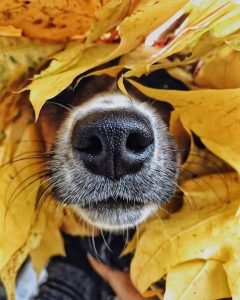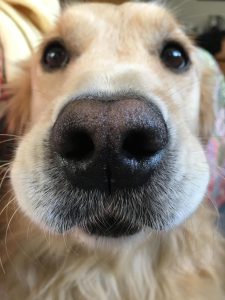Dogs have always fascinated us with their unique characteristics and behaviors. One aspect that often captures our attention is the moist and shiny appearance of their noses. Have you ever wondered why dogs’ noses are wet? In this article, we will delve into the fascinating world of canine physiology to uncover the reasons behind this intriguing phenomenon.

The Role of a Dog’s Nose
- Superior Sense of Smell: Dogs possess an extraordinary sense of smell, far more powerful than that of humans. Their noses are equipped with millions of olfactory receptors, specialized cells responsible for detecting odors. These receptors are sensitive to even the slightest scent particles in the environment.
- Moisture for Enhanced Sensitivity: The moisture on a dog’s nose plays a crucial role in enhancing their sense of smell. When a dog’s nose is wet, it helps to capture and dissolve scent molecules in the air. This allows the olfactory receptors present in their noses to pick up scents more efficiently.
The Science Behind a Wet Dog’s Nose
- Goblet Cells and Mucus: The wetness on a dog’s nose is primarily due to the presence of goblet cells that produce a thin layer of mucus. This mucus helps to trap scent particles and allows them to dissolve, making it easier for the olfactory receptors to detect and process various smells.
- Licking Behavior: Dogs often lick their noses, which further contributes to the moisture on their noses. When a dog licks its nose, it adds a layer of saliva that helps to keep the nose wet. This behavior is instinctive and helps to replenish the moisture on their noses.
- Thermoregulation: A wet nose also serves as a means of regulating body temperature for dogs. The moisture on their noses can help to cool them down as it evaporates. This is particularly beneficial in hot weather or during physical activity when dogs may need to dissipate heat more efficiently.
Variations in Nose Moisture
- Differences Between Breeds: It is important to note that not all dogs have equally wet noses. Some breeds tend to have consistently moist noses, while others may have drier noses. The variations can be attributed to genetics, individual differences, and environmental factors.
- Factors Influencing Dryness: Certain factors can temporarily lead to a drier nose in dogs. These include exposure to dry air, sun exposure, dehydration, or certain underlying health conditions. If you notice persistent dryness or cracking of your dog’s nose, it is advisable to consult a veterinarian for a thorough evaluation.
- Nose Color Changes: Another interesting aspect to note is that some dogs’ noses can change color. For example, certain breeds like the Labrador Retriever may have a pink nose as puppies, which gradually turns black as they mature. These changes in pigmentation are normal and do not affect the function or moisture of the nose.

Caring for Your Dog’s Nose
- Regular Inspection: It is a good practice to regularly inspect your dog’s nose for any abnormalities. Look for signs of excessive dryness, cracking, or unusual discharge. If you notice anything concerning, consult your veterinarian for a proper evaluation.
- Moisturizing Balms: In cases where a dog’s nose becomes excessively dry or cracked, there are various moisturizing balms available specifically formulated for dogs. These balms can help to soothe and hydrate the nose, providing relief and promoting healing.
- Sun Protection: Just like humans, dogs can also experience sunburn. If your dog has a light-colored or pink nose, it is important to protect it from direct sunlight. Apply a pet-safe sunscreen or provide shade to prevent sunburn and potential discomfort.
In conclusion, the moisture on a dog’s nose serves important purposes, primarily enhancing their exceptional sense of smell. The presence of goblet cells and mucus, along with licking behavior, contribute to the wetness. While variations in nose moisture are common among different breeds and individuals, it is essential to monitor your dog’s nose for any changes or abnormalities. By understanding and caring for your dog’s nose, you can contribute to their overall well-being and ensure they continue to explore the world through their incredible sense of smell.
